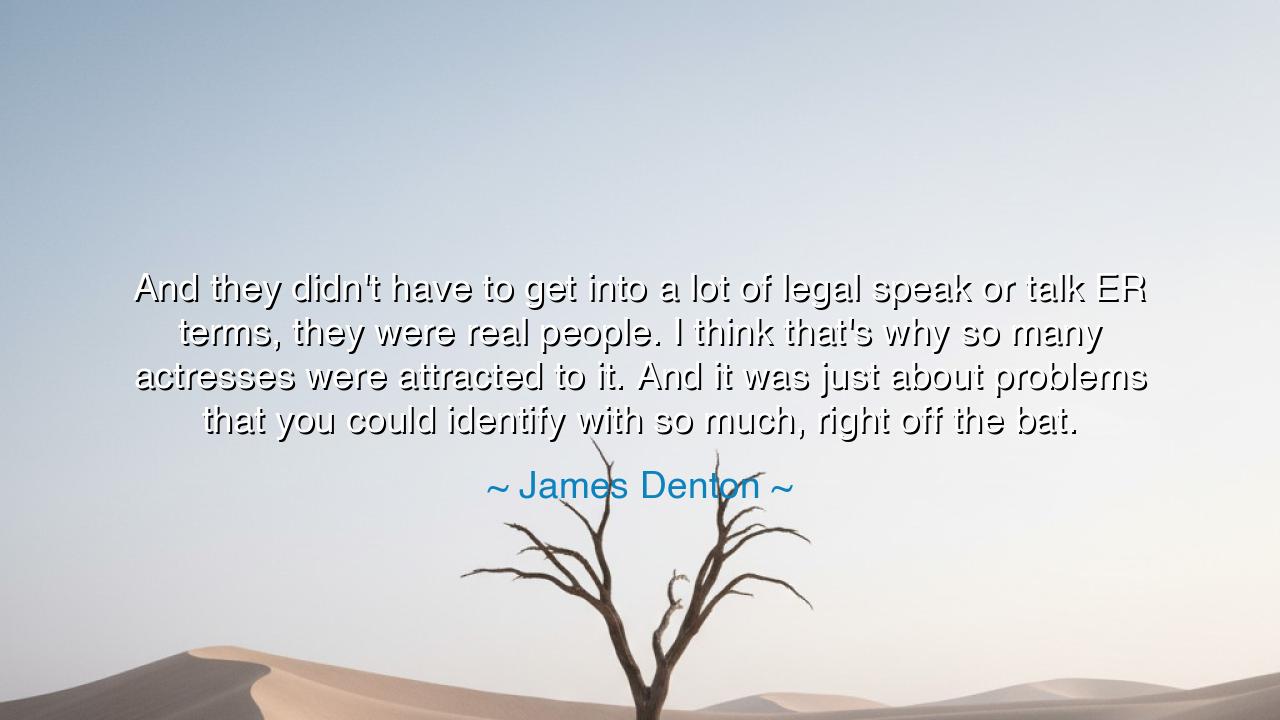
And they didn't have to get into a lot of legal speak or talk ER
And they didn't have to get into a lot of legal speak or talk ER terms, they were real people. I think that's why so many actresses were attracted to it. And it was just about problems that you could identify with so much, right off the bat.






When James Denton reflected, “And they didn’t have to get into a lot of legal speak or talk ER terms, they were real people. I think that’s why so many actresses were attracted to it. And it was just about problems that you could identify with so much, right off the bat,” he was not merely describing a television show — he was describing a return to humanity, to the simplicity of storytelling that mirrors real life. Beneath his modest phrasing lies a profound truth: that art finds its greatest power not in complexity or technical brilliance, but in honesty, in the portrayal of people as they truly are — flawed, striving, and profoundly human. His words remind us that the heart of any story lies not in jargon or spectacle, but in the shared struggles that bind all souls together.
The origin of this quote rests in Denton’s reflections on his work in television, particularly the celebrated series Desperate Housewives, which captured audiences by weaving ordinary domestic life with humor, mystery, and emotion. In a time when television was dominated by shows filled with legal jargon or the sterile intensity of medical dramas, Desperate Housewives stood apart. It spoke not of surgeons and lawyers, but of neighbors, mothers, and lovers — people burdened with secrets, temptations, and hopes much like our own. Denton recognized that this was why the series resonated so deeply with audiences — and why actresses were drawn to it — because it did not demand they play archetypes or professionals, but real people. His reflection is a quiet homage to truth in art: that authenticity is the most magnetic force of all.
The essence of his statement carries echoes of ancient wisdom. In the theater of ancient Greece, the tragedians understood this same principle. Sophocles and Euripides did not write for the gods or the kings alone — they wrote for the human heart. Their heroes, though wrapped in myth, faced the same emotions we do: pride, jealousy, love, and despair. The power of their plays did not come from the grandeur of their settings, but from their recognizable humanity. When Oedipus defied fate, when Antigone defied the law for conscience’s sake, the audience saw not distant legends but themselves. So too, Denton’s words suggest, do modern stories gain greatness when they reveal the ordinary soul beneath extraordinary circumstance.
In saying, “They didn’t have to get into a lot of legal speak or talk ER terms,” Denton draws a subtle contrast between artifice and authenticity. He speaks to an age of storytelling that had grown obsessed with expertise — with doctors saving lives in bright-lit hospitals, or lawyers battling over lofty moral ideals. Such dramas, while captivating, too often spoke in languages far removed from daily life. But when a story abandons the shield of technical dialogue and speaks instead in the plain tongue of the heart, it becomes accessible to all. “Real people,” as Denton calls them, are not defined by profession or title — they are defined by their emotions, choices, and relationships. And in that truth lies a timeless principle: to move others, one must first be real.
His reflection also hints at something deeply spiritual — that connection is born from recognition. When an audience sees themselves in a character, they feel less alone. The success of stories like Desperate Housewives or any tale of simple human struggle lies in that communion between artist and audience. It is the same communion that the wandering storytellers of old sought when they told their tales beside the fire. Whether speaking of gods or housewives, they all reached for the same truth: that life, in all its confusion and imperfection, is sacred when told with honesty.
There is a lesson here for all creators, not just artists. Whether one paints, writes, teaches, or leads, authenticity is the bridge between hearts. The modern world, with its noise and artifice, often tempts us to speak in cleverness rather than sincerity — to impress rather than connect. But as Denton’s reflection teaches, it is the simplest stories, spoken in the language of feeling, that endure. To be real is to be relatable, and to be relatable is to be powerful. The greatest art — and indeed, the greatest life — is not built upon perfection, but upon truth.
Let this wisdom echo through time: speak as a human being, not as a mask of your profession. Whether in art, in conversation, or in love, abandon the “legal speak” and the “ER terms” that shield you from vulnerability. Let your words, your actions, and your creations reflect what is true and felt, not what is polished and rehearsed. For it is in that rawness, that honesty, that others will see themselves and find comfort.
Thus, from the gentle insight of James Denton, we receive an ancient reminder in modern form — that to touch hearts, one must be human first. Stories endure not because of their structure or sophistication, but because they whisper the eternal truth of shared experience. In the end, whether in art or in life, it is not the grand gestures that move the world, but the quiet revelations of our common humanity.






AAdministratorAdministrator
Welcome, honored guests. Please leave a comment, we will respond soon